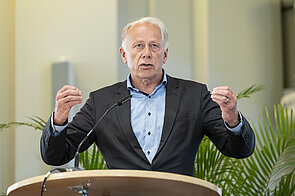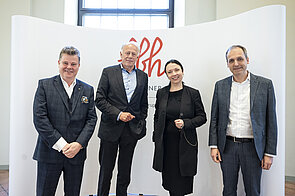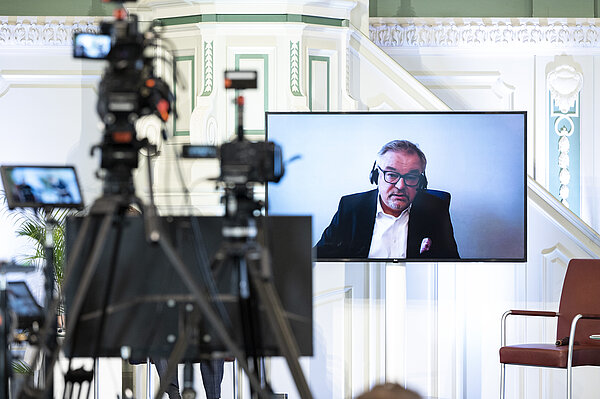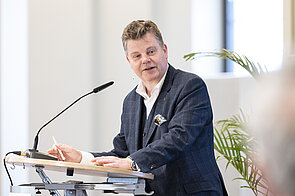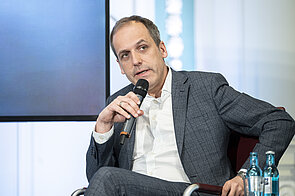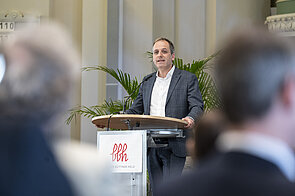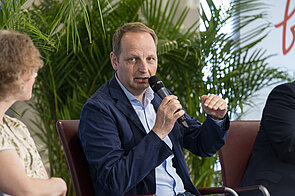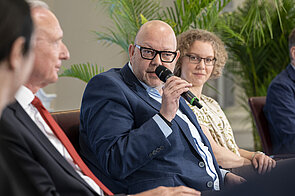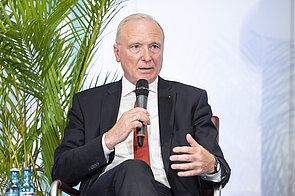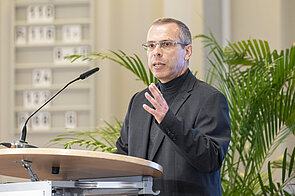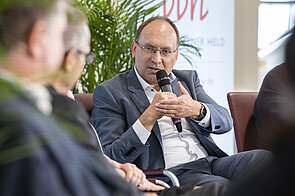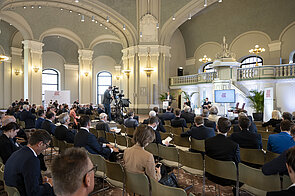BBH’s annual conference: Between globalisation and regionalisation
“I have been working on energy industry matters for 27 years and I have never seen a situation like today’s or imagined that I ever would,” said BBH partner Prof. Dr. Ines Zenke in her introductory remarks. “The war in Ukraine clearly shows that it is of utmost urgency for us, also from a geostrategic point of view, to bring about the transition to a net-zero economy. Concerns over a collapse of our supply structures force us to think about how we are to react in a worst-case scenario. Who would have ever thought that we would have to discuss topics like gas rationing, trusteeships or expropriation.”
Jürgen Trittin, former Federal Minister for the Environment (Bündnis 90/Die Grünen), emphasised that Germany is striving for a permanent independence of the Western markets from Russia, which means that the sanctions are not just temporary.
“A gas phase-out is neither a purely German concern nor is it a trivial matter,” said Mr Trittin. If the supply decreases, prices will go up. Mr Trittin added that we will have to reconcile a fundamental paradox: On the one hand, we will need new long-term supply contracts for the import of fossil fuels in order to be able to make investments; on the other hand, we are working towards a phase-out of fossil fuels by 2045. This will, in any event, require suitable infrastructures. While Mr Trittin does not want to replace import dependency by total self-sufficiency, he advocates for changing the degree of dependency. Mr Trittin proposes that, in the future, 70% of our energy demand should be covered by domestic production and 30% by energy imports. At the moment, it was the other way round.
In any case, hydrogen will play a key role in our energy supply, whether through imports or domestic production. MEP Jens Geier (SPD/S&D), European Parliament rapporteur on the European strategy for hydrogen, informed the attendees about the current state of the discussions regarding the development of the hydrogen market, voicing his discontent with the European Commission’s draft for amending the Internal Gas Market Directive.
“I will strive for ensuring that municipal utility companies can play an active part in establishing the future hydrogen network. We must make sure to integrate the expertise that municipal utility companies gained over decades as municipal energy suppliers. However, I am concerned that the Commission’s unbundling proposals will greatly hamper the ability of municipal utility companies to participate in the hydrogen market, as a result of which municipal earnings would significantly deteriorate. I will do my level best to make sure that this does not happen.”
BBH partner Prof. Christian Held, too, considers the draft Directive to be a step backwards rather than forwards. “The ownership unbundling as proposed by the European Commission in its draft Gas Market Directive prevents a rapid market development in the area of hydrogen,” said Prof. Held. “In view of the ambitious climate policy goals in Germany and Europe, we simply cannot afford to abandon our existing and well-established infrastructure in the future. We need the gas grid operators to secure our energy supply also in the hydrogen age, which is why there must be no factual ownership unbundling in this area. Otherwise, we will have to start again from scratch.” Mr Geier wants to submit his proposals by June this year so that the legislative amendment can be finalised by the end of 2022.
So, what will energy supply look like in the years up to 2045, the year of climate neutrality, and beyond? According to Dr. Alexander Götz, deputy CEO of the German Association of Local Utilities (VKU), it must be ensured that energy suppliers can continue to operate effectively in the long term with viable solutions for the industry and consumers. He calls for an unbiased examination of all possible solutions, emphasising that there should be “no barriers”. And he reminded the attendees that the replacement value of the German gas infrastructure totals EUR 72 billion. The costs of converting gas grids to hydrogen grids would be comparatively low. From an economic point of view, the future of the gas grids is thus clear.
However, the specific political measures required for paving the way to 2045 are not that evident. But, as Dr. Julia Verlinden, Member of the Bundestag (Bündnis 90/Die Grünen), put it: “We, the traffic light coalition, are doomed to succeed”. With its 600-page Easter Package, the Federal Government has, in any case, produced an ambitious draft. This is something the conference participants agreed upon although amendments have already been announced. Thomas Heilmann, Member of the Bundestag (CDU/CSU), signalled in the parliamentary panel discussion that his party is “principally ready to cooperate”.
Ralph Lenkert, Member of the Bundestag (Die Linke), emphasised the importance of a strong legislative framework that ensures social security and requires companies to act in an environmentally responsible manner. Olaf in der Beek, Member of the Bundestag (FDP) advocated the mobilisation of more private capital for the transformation of our energy supply system on the basis of adequate funding schemes, for example regarding PV systems or heat pumps. Although, in this context, the planning, approval and licensing procedures will have to be sped up, too. According to Bernd Westphal, Member of the Bundestag (SPD), this is an area where processes can indeed be accelerated. He also emphasised that security for the society and businesses must be ensured throughout the transition. The parliamentary process has commenced. It is now up to the Members of the Bundestag to provide the right incentives, remove obstacles and to do everything they can to support the transformation and speed up the right steps.
However crucial the political solutions for our way out of the crisis and into climate neutrality, in the end, it is always the companies that have to implement them (individually). This requires courage and smart entrepreneurial strategies. BBH’s annual conference was just the occasion to discuss this topic with Holger Becker, member of the board of directors of the large-scale power plant Grosskraftwerk Mannheim Aktiengesellschaft, Heike Heim, chair of the management board of the energy and water supply company Dortmunder Energie- und Wasserversorgung GmbH, Michael Teigeler, managing director of the public utility Stadtwerke Heidelberg Energie GmbH, and Alexander Voigt, spokesman of the board of directors of HH2E AG, an energy startup operating at the interface of renewable energy sources and hydrogen. The managers pointed out the challenges and opportunities of the road that must be taken.
The panel discussion concluded this year’s successful annual conference of BBH with several hundreds of attendees and discussions on the tug of war between crisis management and climate neutrality. Between 2022 and 2045. And between globalisation and regionalisation.
(Kopie 24)
The BBH group is a leading provider of advisory services for energy and infrastructure companies and their customers. Energy and supply companies, particularly public utilities, municipalities and local authorities, industrial companies and international groups are among its core clients. The BBH group advises these and many other companies and organisations in all legal matters and also assists them with business and strategic advice.
Contact:
Prof. Dr. Ines Zenke
Rechtsanwältin/Lawyer, Partner
Phone +49 (0)30 611 28 40 - 179
ines.zenke@bbh-online.de
Visit the BBH group online at www.die-bbh-gruppe.de, www.bbh-blog.de, twitter.com/BBH_online or instagram.com/die_bbh_gruppe



